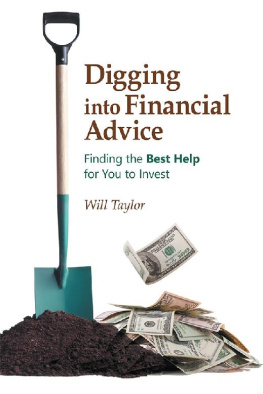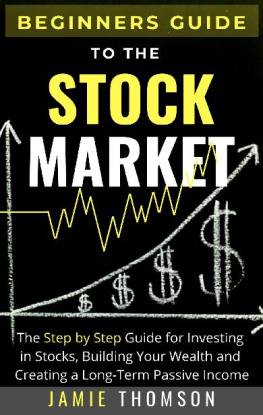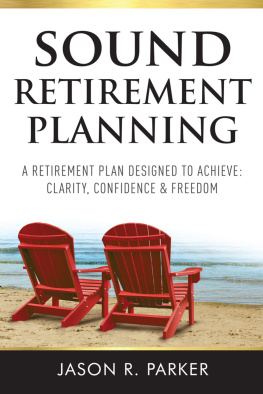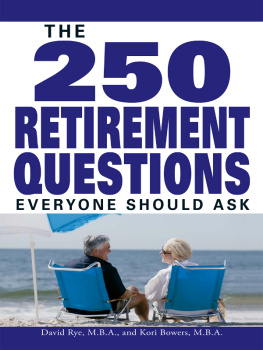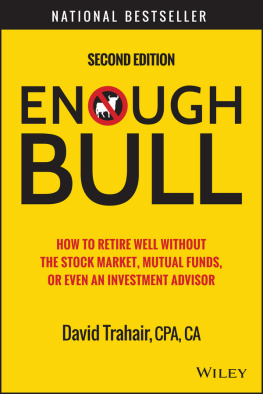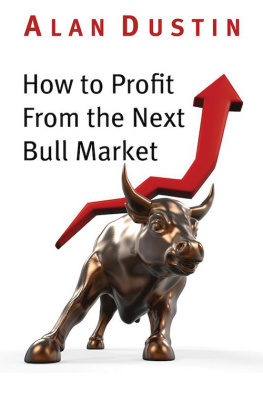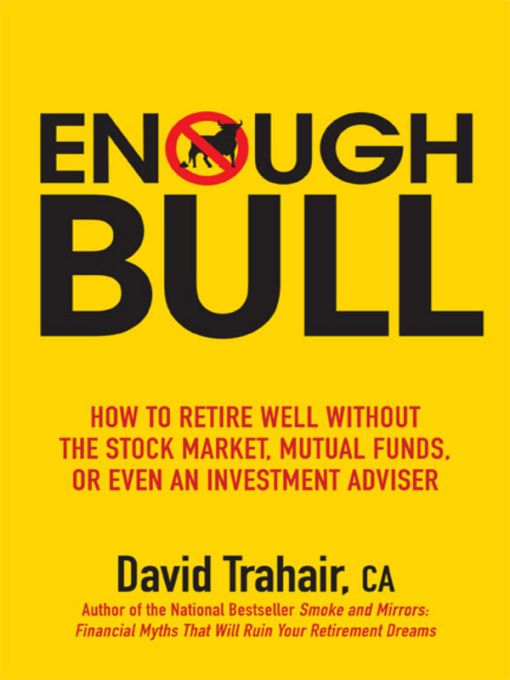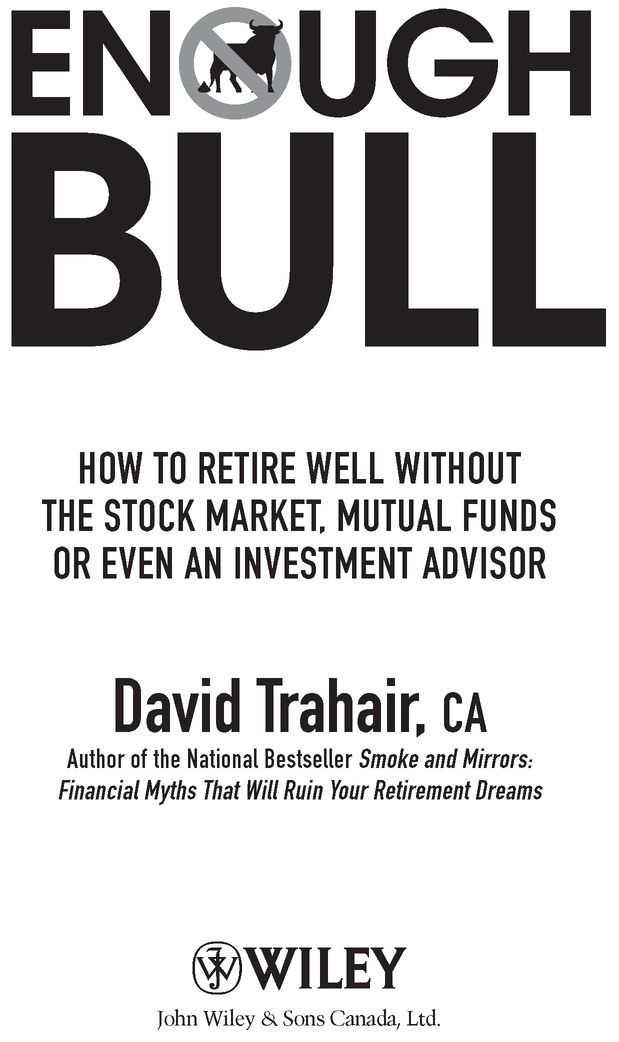Table of Contents
ACKNOWLEDGEMENTS
Id like to start off by thanking the two people that are responsible for the creation of this book. Those people are my literary agent, Hilary McMahon of Westwood Creative Artists, and Karen Milner of John Wiley & Sons Canada, Ltd., my publisher. If not for Hilarys belief in the idea and Karens enthusiasm for seeing it get into print, you wouldnt be holding it right now.
Id like to dedicate it to two other significant people in my life. First, to my mom, Florence Trahair, who passed away in 2008 at age eighty-two. She was always my biggest supporter. I felt her presence as I wrote this book. And second, to my father-in-law, Jack Baxter, who passed away in 2006 at age sixty-eight. Jack was one of my best buddies. He taught me how to enjoy life. I know he enjoyed each and every day of his.
INTRODUCTION
We have just lived through a period of time that shifted the financial world on its axis. The old rules regarding personal finance are now history, as in obsolete.
This happened in the last quarter, the autumn, of 2008. Lets call it The Fall of 2008.
THE FALL OF 2008
During this period, decades-old financial institutions simply disappeared. World stock markets tanked. Entire investment portfolios were devastated. Retirement dreams were wiped out. And its probably not going to get better soon.
What this series of events has done is show quite clearly the naked truth: traditional financial planning techniques dont work. In fact, if we had done the opposite of what the experts have told us to do to get ahead financially, we would be far better off today. Here are some of the past theories and the new reality:
Trust the stock market to make us wealthy? Never again.
Pay our investment advisor a fee of more than 2% a year to try to beat the market? I dont think so.
Risk our home trying to make our mortgage tax deductible by investing in mutual funds? Please, give me a break.
Maximize our RRSP contributions religiously each and every year... and also save 10% of our income above that. You must be kidding, right?
Borrow to investleverage our way to riches? Forget it. Many have tried; you can now find most of them in the poor-house.
Skip a cup of coffee to get rich automatically? Yeah, right.
I am not opposed to capitalism. We need efficient stock markets so that entrepreneurial people can grow businesses that flourishbusinesses that create great products, deliver excellent services, hire good people, make profits and pay taxes.
The problem is that, obviously, markets have not been regulated satisfactorily. Businesses, especially financial ones in the United States, have been allowed to run rampant in the quest for riches. Thousands of intelligent, well-educated people making six-figure salaries and multi-million dollar bonuses spent years creating complex financial products that were sold to unsuspecting members of the public.
Ever heard of collateralized debt obligations? Mortgage-backed securities? Non-bank asset-backed commercial paper? What about income trusts? Or even mutual funds?
These complex instruments made many people rich. The people that invented them. The people that re-packaged them. And the people that sold them.
Unfortunately, the vast majority of people that bought into them got screwed. Theres the homeowner with no job and no money who was convinced to take out a mortgage on his home and ended up losing it. Theres the government, and you and me as the taxpayers, forced to shell out billions of dollars to buy into financial houses-of-cards just to keep them afloat. And of course, theres anyone who holds investments in these worthless companies.
ANGRY YET?
I am, and thats why I wrote this book. To give you hope. To show you that there is a way to get ahead financially. And you dont have to be a genius or trust a financial expert to get you there.
Im going to show you how you can do it with a guarantee that in the future your investments will never decline. I can say that because we wont be using the stock market. We wont even be using mutual funds. It is so easy to follow you wont even need to think about it for more than a few hours a year. It is so simple that once implemented you wont even need an investment advisor.
Its the plan laid out in this book that you can read in less than one day. After you read this book youll be able to explain it fully in five minutes.
WHY I WROTE THIS BOOK
I wrote it because I have received a lot of e-mails like this:
Good morning, David. I have just finished reading your book Smoke and Mirrors: Financial Myths That Will Ruin Your Retirement Dreams and I couldnt agree with you more. I am, however, concerned about my daughter and son-in-law who have this mantra that everything goes into the RRSP. I need to educate them and your line of thinking is what I need to approach them with.
While my children are quite well off, I am scraping byhaving lost most of my portfolio in the recent stock market crash while my husband was going through a major cancer operation and my portfolio was not on my mind and, sad to say, nor on my brokers mind. The good thing is hubby survived, but our belts are very tight as a result of looking the other way for even a few days.
Joanne
This e-mail arrived in January of 2005. The stock market crash she was talking about was the crash of March of 2000. In 2008 I started to hear more such stories.
YOUR RETIREMENT JOURNEY
But does the whole idea of financial planning need to be so complex? If you listen to all the experts, youll often end up confused. You may be thinking:
My investment advisor is telling me I have to invest more but my existing savings have just gotten whacked in the market. Isnt that like throwing good money after bad?
Getting my finances in order is going to be painful. Forget it. I want to live now!
This is all so depressing. I never seem to be making much progress.
All the standard retirement advice says that Im on the wrong track. Jeez, my unused RRSP room is huge!
Personal finances are very complex; I can never get a good handle on what is going on with my money even after talking to my broker.
I may never be able to afford to retire!
You know what? It doesnt have to be confusing or complicated. It never used to be. Things like mutual funds, RRSPs and even capital gains tax did not even exist before the seventies. The truth is that the whole subject of personal finance has been made complicated because it makes money for the people that run the financial system. It is designed to be complex so that these financial types can continue to earn six-figure salariesoff the hard-earned savings of the little guy and gal.
Lets make an analogy, shall we? They want us to believe that the typical journey to retirement is like a trip down a river. A river is the best way to get therewalking is too slow. Its a complicated journey, so youll obviously need a guide, right?
Down the River
We arrive at our advisors headquarters to learn about the trip we are about to take.
Welcome friends, youve come to the right place! We have been in business for more than twenty years and we know rivers like the back of our hands. Trust uswell get you to your destination safely.


